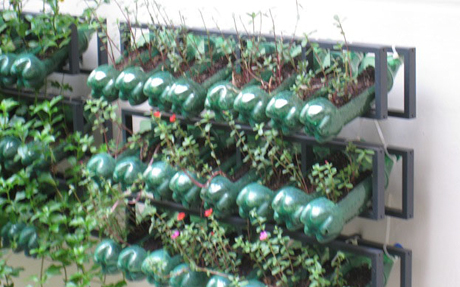Vertical gardening to improve Ethiopian dietPosted Jul 26, 2013 |
|

Vertical gardening is an agricultural method that maximizes land use
Photo: Anglican Communion News Service
[Anglican Communion News Service] The Anglican Church in Ethiopia is promoting a unique agricultural practice called “vertical gardening” to combat the region’s high levels of malnutrition due to a lack of variety in peoples’ diets and a shortage of agricultural land.
“Since its establishment, one of the goals of the Gambella Anglican Centre in Ethiopia has been to model small-scale agricultural projects and provide training, so that food gardening can be reproduced across Gambella,” said the Project Supervisor and Area Bishop for the Horn of Africa, the Rt. Rev. Dr. Grant LeMarquand.
The Gambella Anglican Centre is in Gambella Township the capital of Gambella Regional State, located in the western part of Ethiopia close to South Sudan, and is one of the poorest and least developed of Ethiopia’s nine states.
“Local peoples’ land in Gambella is being expropriated leaving them with less land for cultivation,” said the bishop. “Most people in the villages and in the Anglican congregations in Gambella don’t have any substantial land to cultivate and hence the idea of a vertical garden to allow people increase their crop yield within their present land and water constraints.”
“We have also noticed a low level of knowledge about nutrition and the importance of a balanced and varied diet,” observed the project supervisor. “The vertical garden would serve as an interactive learning site where villagers from all over Gambella could learn about easy and sustainable gardening techniques and how to incorporate new fruits and vegetables into their diets.”
A recent study revealed that in some parts of Ethiopia, there is a high frequency of nutritional problems such as rickets, beriberi, pellagra and kwashiorkor especially among children, caused by high levels of malnutrition.
“Each family in the villages has a small plot of land with a ‘security wall.’ This is therefore an ideal starting point for creating and reproducing these gardens around Gambella,” said Bishop LeMarquand.
“Demonstrating how to grow vertical gardens and a wider range of vegetables will also provide us the opportunity to teach nutrition and thereby improve the health and nutritional status of various communities throughout Gambella.”
The Church in Ethiopia intends to conduct prior training for the local community to ensure adequate understanding of this farming method. “The wall at our centre will be divided into sections, and each section will be assigned to a staff member, church member, theological student, or member of the community,” revealed the bishop.
He added:”before the wall is assigned, training will be provided to introduce the vegetables that could be planted, discuss the importance of a varied diet and how they can use their section of the wall”.
The Gambella Anglican Centre, which opened in July 2010, currently hosts the St. Barnabas’ congregation, library facilities, sports programmes, an agricultural program and hosts groups from the community and local churches.
The work of the Anglican Church in Gambella began in the 1990s in refugee camps in the region. Since then, through building relationships with indigenous peoples, the church has grown at a fast rate. There are approximately 70 congregations with about 6,000 people attending each week.


Social Menu